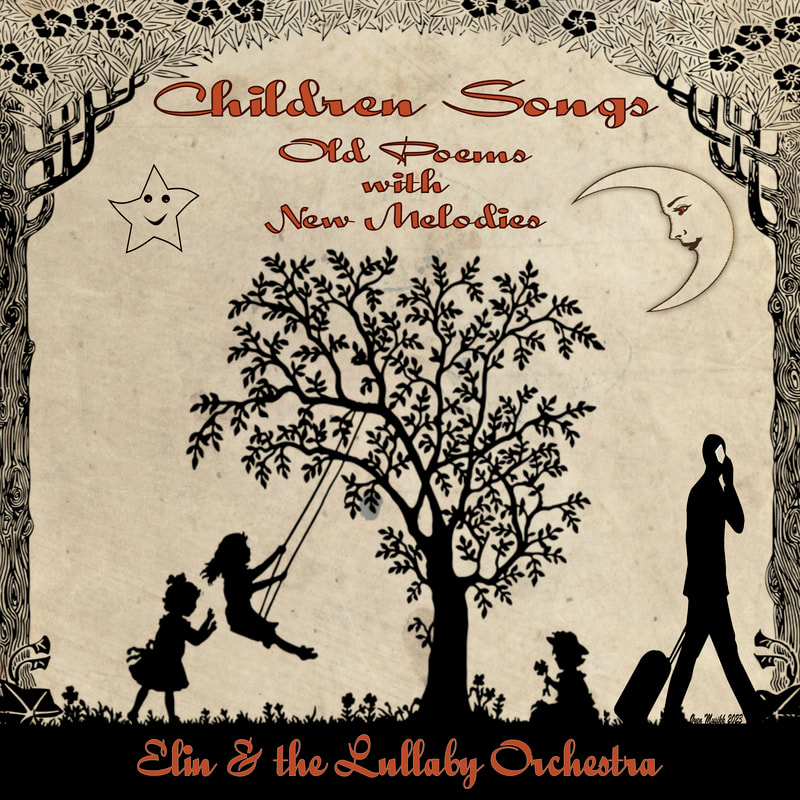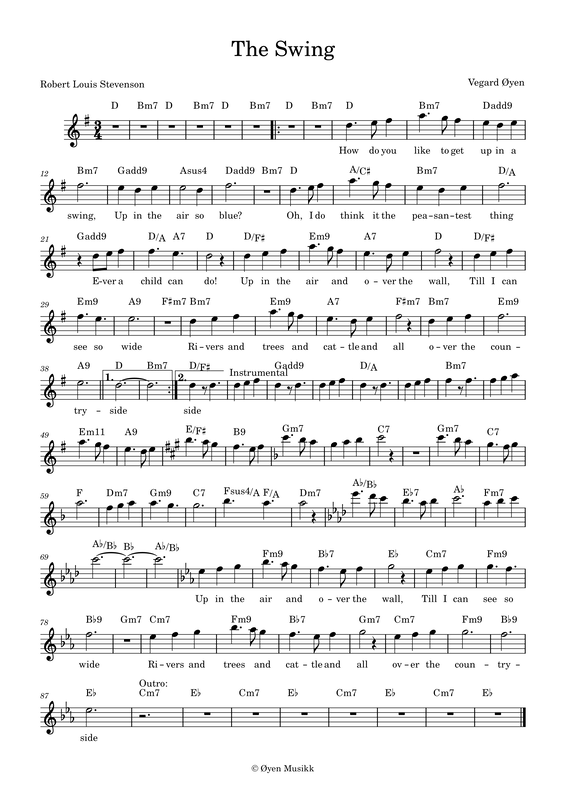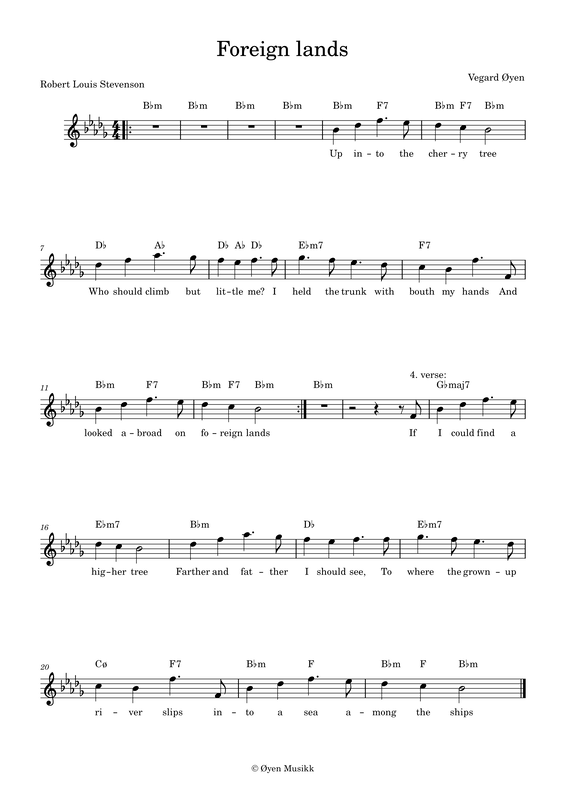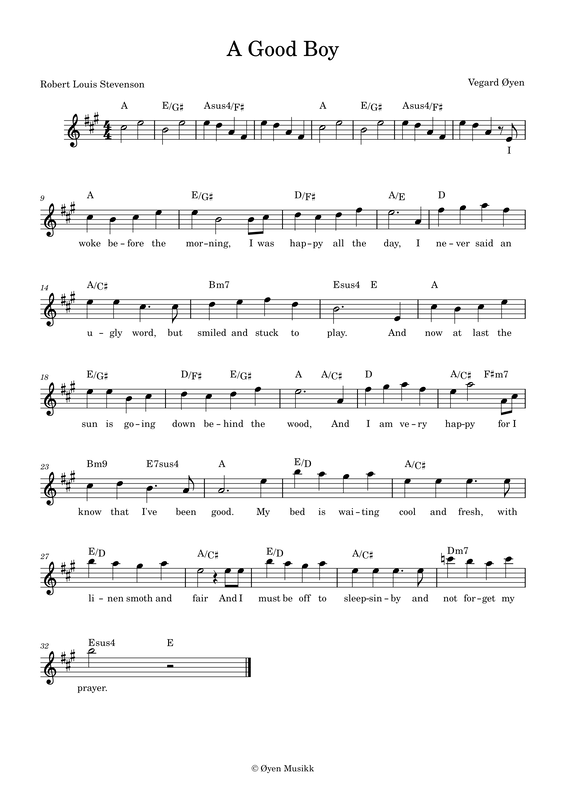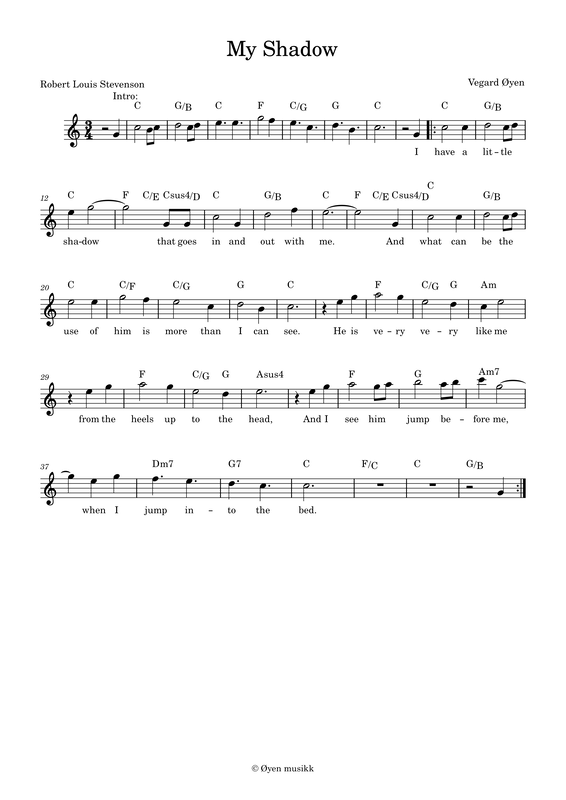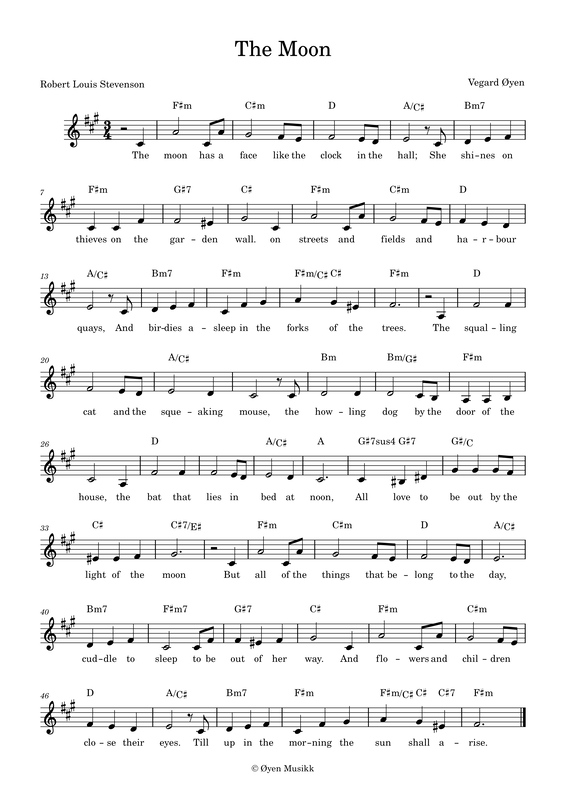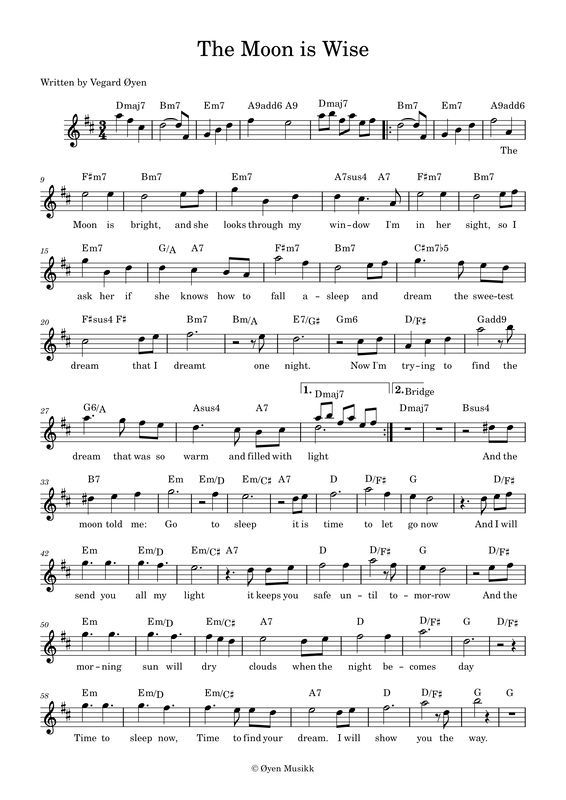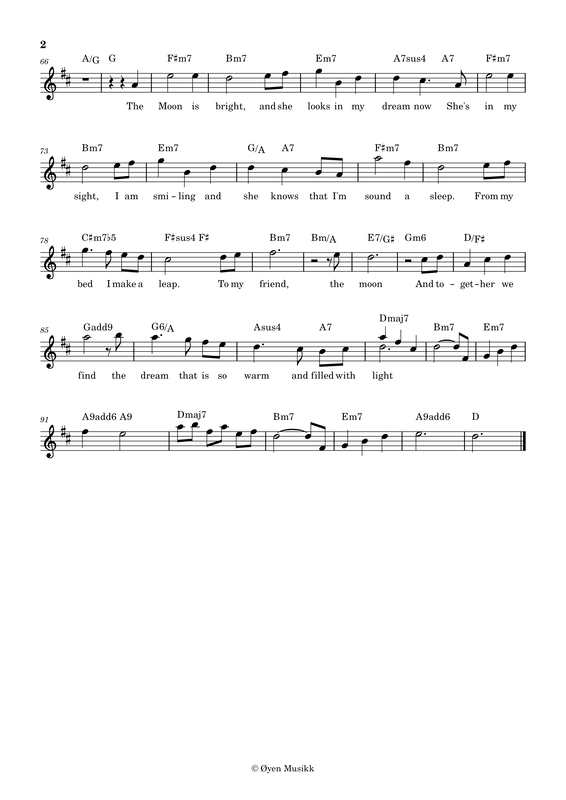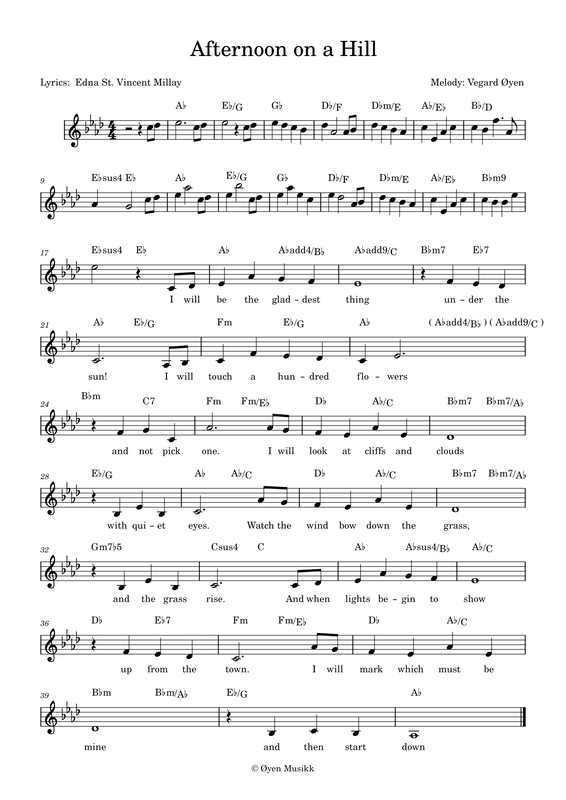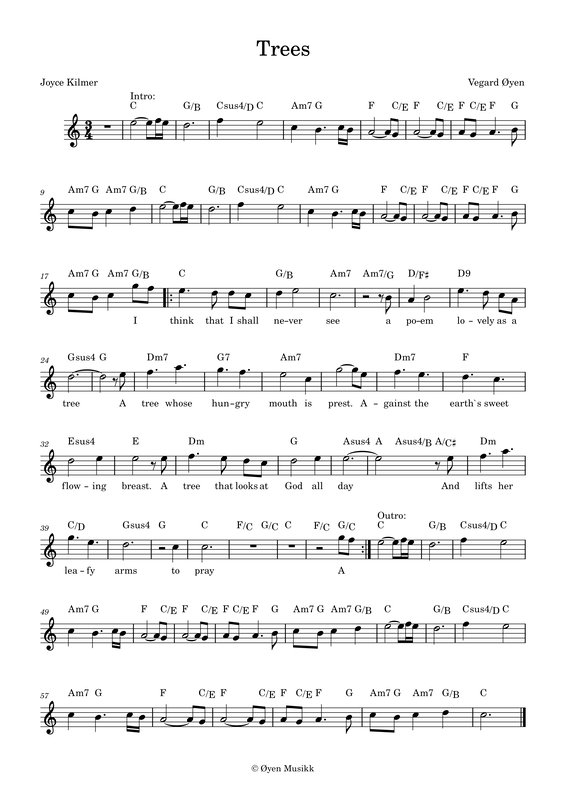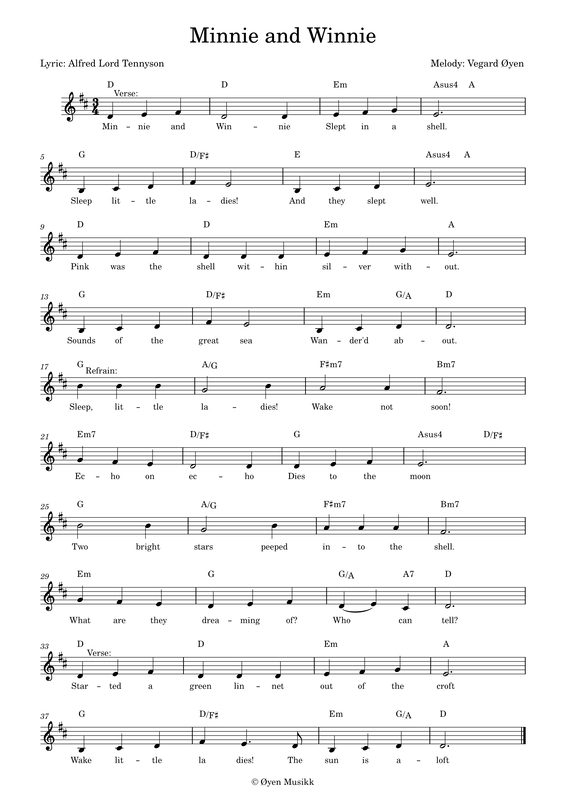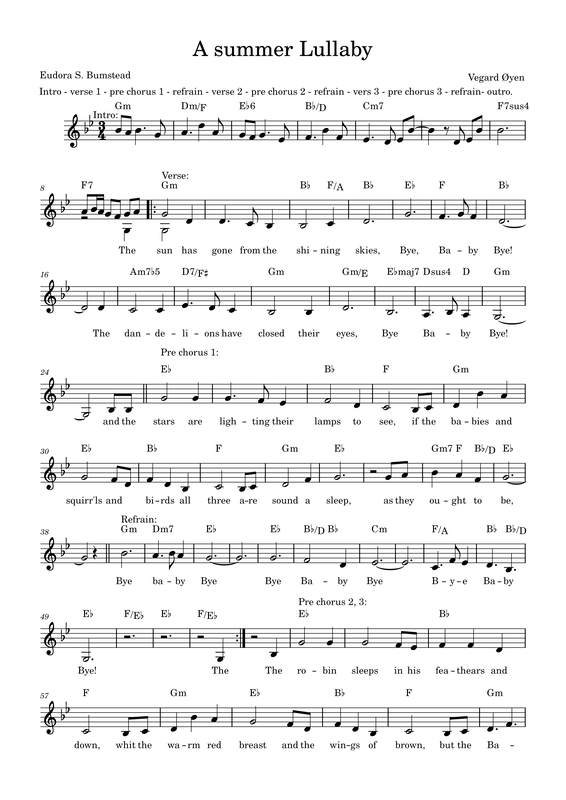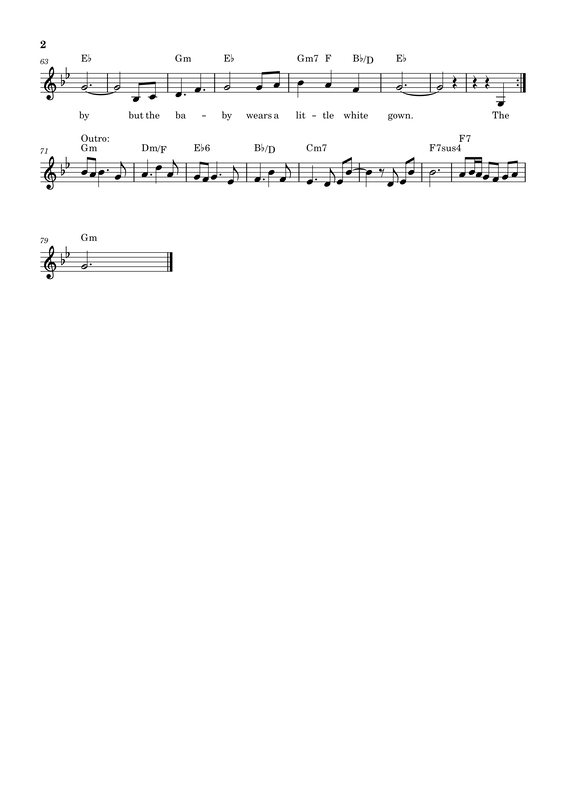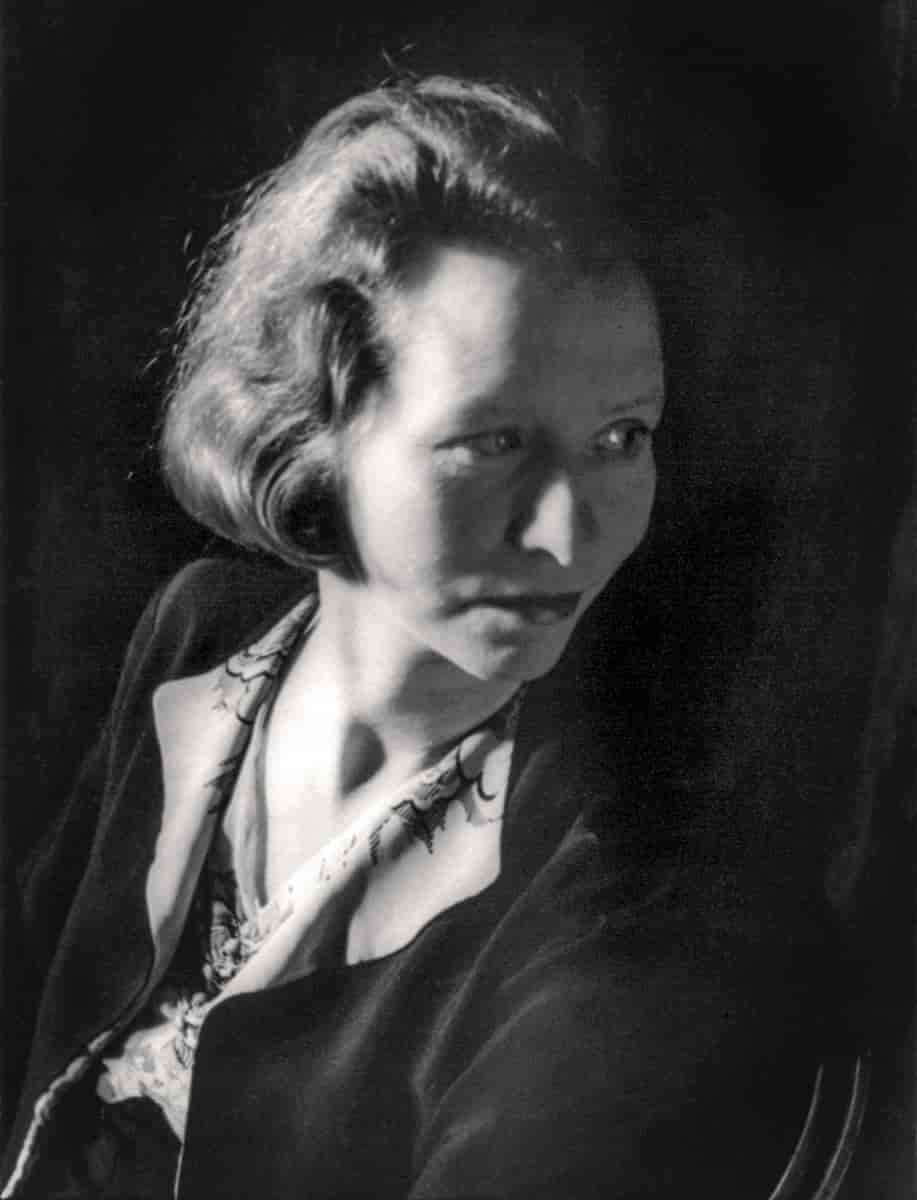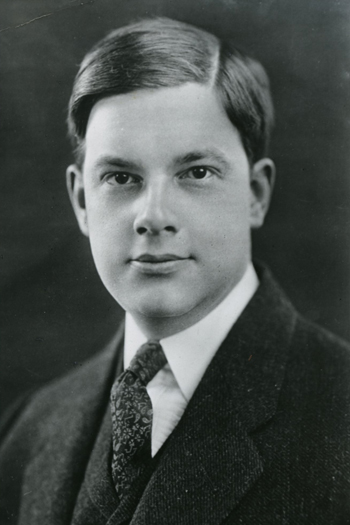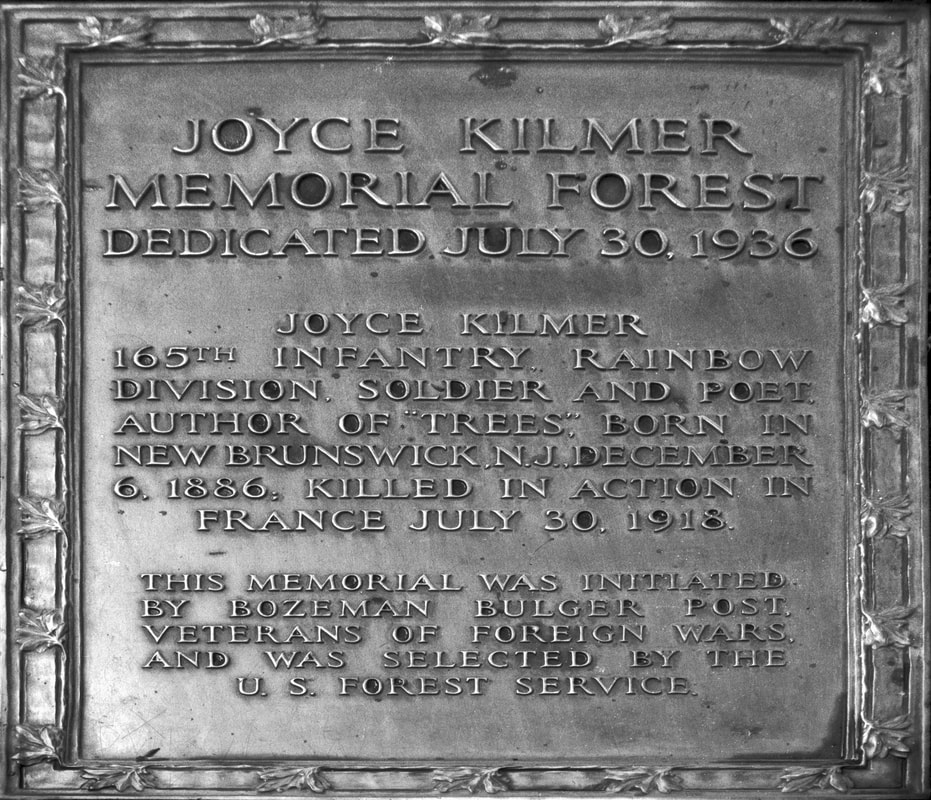|
Download free sheets to all the songs on the album:
Children Songs - Old Poems with New Melodies1 Bed in Summer
|
| ||
|
Bed In Summer
(Robert Louis Stevenson) In Winter I get up at night And dress by yellow candle light. In Summer, quite the other way, I have to go to bed by day. I have to go to bed and see The birds still hopping on the tree, Or hear the grown-up people's feet Still going past me in the street. And does it not seem hard to you, When all the sky is clear and blue, And I should like so much to play, To have to go to bed by day? |
|
The Swing
(Robert Louis Stevenson) How do you like to go up in a swing, Up in the air so blue? Oh, I do think it the pleasantest thing Ever a child can do! Up in the air and over the wall, Till I can see so wide, River and trees and cattle and all Over the countryside Till I look down on the garden green, Down on the roof so brown-- Up in the air I go flying again, Up in the air and down! |
|
Foreign Lands
(Robert Louis Stevenson) Up into the cherry tree Who should climb but little me? I held the trunk with both my hands And looked abroad on foreign lands I saw the next-door garden lie, Adored with flowers before my eye, And many secret places more That I have never seen before. I saw a dimpling river pass And be the sky's blue looking-glass; The dusty roads go up and down With people tramping in to town. If I could find a higher tree Farther and farther I should see, To where the grown-up river slips Into a sea among the ships, To where the roads on either hand Lead onward into fairy land, Where all the childen dine at five, And where all the playthings come alive. |
|
A Good Boy
(Robert Louis Stevenson) I woke before the morning, I was happy all the day, I never said an ugly word, but smiled and stuck to play. And now at last the sun is going down behind the wood, And I am very happy, for I know that I've been good. My bed is waiting cool and fresh, with linen smooth and fair, And I must be off to sleepsin-by, and not forget my prayer. I know that, till to-morrow I shall see the sun arise, No ugly dream shall fright my mind, no ugly sight my eyes. But slumber hold me tightly till I waken in the dawn, And hear the thrushes singing in the lilacs round the lawn. |
|
My Shadow
(Robert Louis Stevenson) I have a little shadow that goes in and out with me, And what can be the use of him is more than I can see. He is very, very like me from the heels up to the head; And I see him jump before me, when I jump into my bed. The funniest thing about him is the way he likes to grow - Not at all like proper children, which is always very slow; For he sometimes shoots up taller like an india-rubber ball, And he sometimes goes so little that there's none of him at all. He hasn't got a notion of how children ought to play, And can only make a fool of me in every sort of way. He stays so close behind me, he's a coward you can see; I'd think shame to stick to nursie as that shadow sticks to me! One morning, very early, before the sun was up, I rose and found the shining dew on every buttercup; But my lazy little shadow, like an arrant sleepy-head, Had stayed at home behind me and was fast asleep in bed. |
|
The Moon
(Robert Louis Stevenson) The moon has a face like the clock in the hall; She shines on thieves on the garde n wall, On streets and fields and harbour quays, And birdies asleep in the forks of the trees. The squalling cat and the squeaking mouse, The howling dog by the door of the house, The bat that lies in bed at noon, All love to be out by the light of the moon. But all of the things that belong to the day Cuddle to sleep to be out of her way; And flowers and children close their eyes Till up in the morning the sun shall arise. |
|
The Moon is Wise
(Vegard Øyen) The moon is bright, and she looks through my window I'm in her sight so I ask her if she knows how to fall asleep and dream the sweetest dream That I dreamt one night. Now I'm trying to find the dream that was so warm and filled with light. The moon looks down, and I think she is smiling She knows for sure that I'm here and I'm trying to fall asleep and dream the sweetest dream That I dreamt one night. Now I'm trying to find the dream that was so warm and filled with light. The Moon is wise. So I hope she can tell me the secret words, some advice that can guide me so I find the way to dream the sweetest dream That I dreamt one night. Now Im hoping to find the dream that was so warm and filled with light. Go to sleep It is time to let go now. And I will send you all my light It keeps you safe until tomorrow And the morning the sun will dry up the clouds when the night becomes day. Time to sleep now time to find your dream I will show you the way. The moon is bright, and she shines in my dream now She's in my sight, I am smiling and she knows that I'm sound asleep. From my bed I make a leap. To my friend, the moon. And toghether we find the dream that is so warm and filled with light. |
|
Afternoon on a hill
(Edna St. Vincent Millay) I will be the gladdest thing Under the sun! I will touch a hundred flowers And not pick one. I will look at cliffs and clouds With quiet eyes, Watch the wind bow down the grass, And the grass rise. And when lights begin to show Up from the town, I will mark which must be mine, And then start down! |
|
Trees
(Joyce Kilmer) I think that I shall never see A poem lovely as a tree. A tree whose hungry mouth is prest Against the earth's sweet flowing breast; A tree that looks at God all day, And lifts her leafy arms to pray; A tree that may in Summer wear A nest of robins in her hair; Upon whose bosom snow has lain; Who intimately lives with rain. Poems are made by fools like me, But only God can make a tree. |
|
Minnie and Winnie
(Alfred Lord Tennyson) Minnie and Winnie Slept in a shell. Sleep, little ladies! And they slept well. Pink was the shell within, Silver without; Sounds of the great sea Wander’d about. Sleep, little ladies! Wake not soon! Echo on echo Dies to the moon. Two bright stars Peep’d into the shell. ‘What are they dreaming of? Who can tell?’ Started a green linnet Out of the croft; Wake, little ladies, The sun is aloft! |
|
A Summer Lullaby
(Eudora S. Bumstead) The sun has gone from the shining skies, Bye, Baby, Bye! The dandelions have closed their eyes, Bye, Baby, Bye! And the stars are lighting their lamps to see If the babies, and squirr'ls, and birds, all three Are sound a-sleep, as they ought to be, Bye, Baby, Bye! Bye, Baby, Bye! The squirrel is dressed in a coat of gray, Bye, Baby, Bye! He wears it by night as well as by day, Bye, Baby, Bye! The robin sleeps in his feathers and down, With the warm red breast and the wings of brown, But the baby, but the baby wears a little white gown Bye, Baby, Bye! The squirrel's nest is a hole in the tree, Bye, Baby, Bye! And there he sleeps as sug as can b e, Bye, Baby Bye! The nobin's nest is high overhead, Where the leafy boughs of the maple spread, But the baby's nest, but the baby's nest Is a little whitebed, Bye, Baby, Bye! Bye, Baby, Bye! |
|
Edna St. Vincent Millay was an American poet, playwright, and feminist. She was born in 1892 in Rockland, Maine, and began writing poetry at a young age. She went on to attend Vassar College, where she studied literature and drama.
Millay's poetry often dealt with themes of love, desire, and the changing roles of women in society. She wrote in a free-verse style that was both elegant and emotionally direct, and her work was known for its wit and musicality. She wrote many collections of poetry such as "Renascence" and "A Few Figs from Thistles". Millay was a prominent figure in the world of literature and the arts during the early 20th century. She was the first woman to receive the Pulitzer Prize for poetry, which she won in 1923 for her collection "The Ballad of the Harp-Weaver." She was also an advocate for women's rights and an active member of the feminist movement of her time. Millay's poetry also often drew inspiration from her own experiences, she wrote about love, desire, independence, and her disillusionment with society. She also wrote many sonnets throughout her career, which was an unusual form for a woman poet at the time and helped to shape a new direction for poetry. Today, Millay's poetry continues to be widely studied and celebrated for its literary merit, emotional power, and her unique voice. She has had a strong influence on many poets who followed her, and she remains one of the most important figures in American poetry of the 20th century |
"Afternoon on a Hill" is a poem written by Edna St. Vincent Millay. The poem is a celebration of the natural world and the simple pleasures that can be found in it.
The speaker of the poem expresses a desire to be "the gladdest thing" under the sun and to take pleasure in the beauty of the natural world without needing to possess it. They express a willingness to simply look at the flowers, cliffs, clouds and watch the movement of nature without seeking to control or own it. The imagery used in the poem such as 'touch a hundred flowers and not pick one' show the detachment and simple appreciation of the beauty of nature. The poem also has a sense of time and change, as the speaker watches the wind "bow down the grass" and then sees the grass "rise," indicating the passing of time and the cycles of nature. At the end of the day, when the lights in the town come on, the speaker will decide which light is theirs and make their way back down the hill. The last stanza can be seen as a metaphor for the speaker's life and choices, having enjoyed the beauty of nature, now it's time to make a choice, to choose their own path or way back to their own life. Overall, the poem is a reminder to appreciate and enjoy the simple beauty of nature and to live in the present moment. |
|
Joyce Kilmer was an American poet, journalist, and literary critic. He was born in 1886 in New Brunswick, New Jersey, and began writing poetry at an early age. He attended Columbia University, where he studied English and Philosophy.
Kilmer's poetry is often characterized by its simplicity and idealism. He wrote in a traditional, rhyming style and his work often dealt with themes of nature, God, and beauty. His most famous poem is probably "Trees" which is known for its simple, direct style, and its celebration of the beauty and majesty of trees. Kilmer was also a journalist and literary critic, and he wrote for a number of newspapers and magazines during his career. He was a devout Roman Catholic and his faith was an important part of his life and work. During World War I, Kilmer enlisted in the United States Army and served as an intelligence officer with the 69th Infantry Regiment. He died in 1918 during the Second Battle of the Marne, and is buried in Oise-Aisne American Cemetery, France. After his death, Kilmer's poetry enjoyed a brief period of popularity, and he is remembered today for his simple, direct style and his love of nature. His poem "Trees" is particularly well-known and has been widely anthologized. Even though his poetry career was short lived, his name became widely known with his famous poem "Trees" and is remembered today for its simplicity and beauty, a reflection of his love for nature and his religious beliefs. |
"Trees"
The poem is a celebration of the natural beauty and majesty of trees. It expresses the idea that trees are perfect, complete and beautiful creations of God, while on the other hand, poems can only be made by "fools like me" The poem uses imagery of the tree being close to nature, with its "hungry mouth pressed against the earth's sweet flowing breast" to draw a parallel with the tree's connection to the earth and the sustenance it receives from it. Additionally, the tree is described as "lifting her leafy arms to pray" which can be seen as a metaphor for the tree's connection to the spiritual world, and the idea that it is constantly communing with God. The poem also describes the tree's connection to the cycles of nature and the changing seasons, referencing summer and winter, robins nesting and the intimate relationship with rain. The poem concludes with the line "Poems are made by fools like me, but only God can make a tree", emphasizing the idea that trees are perfect creations of God, and cannot be replicated by human effort. Overall, the poem is a tribute to the natural beauty and majesty of trees and the powerful, silent witness of nature. It's a simple and direct poem that resonates with many people for its deep and emotional connection with nature and the divine. |
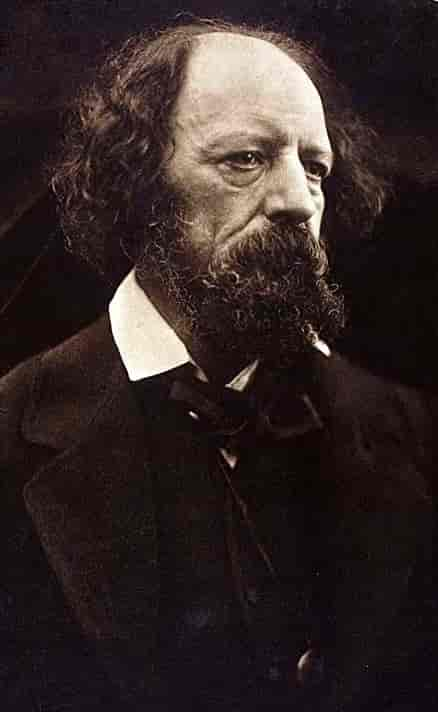
Alfred Lord Tennyson was an English poet and playwright who lived during the 19th century. He was born in 1809 in Lincolnshire, England, and began writing poetry at a young age. He was appointed Poet Laureate of the United Kingdom in 1850, a position he held until his death in 1892.
Tennyson was one of the most popular poets of his time, known for his powerful and emotive language, and his ability to capture the essence of the human experience. His poetry often deals with themes of love, nature, and the passage of time. He wrote many famous poems such as "The Lady of Shalott", "The Charge of the Light Brigade", "Ulysses" among others.
His most famous work, "The Charge of the Light Brigade", a narrative poem that describes the heroism and sacrifice of the soldiers during the Crimean War, was published in 1854 and was a great success.
His "In Memoriam A.H.H." written in memory of Arthur Hallam, a close friend who died suddenly in 1833, is a long and beautiful elegy, considered as one of his major work, it's an exploration of grief, loss and consolation.
His poetry is notable for its musical quality and its ability to convey powerful emotions through the use of language. Many of his poems are still widely read and studied today, and his influence can be seen in the work of many poets and writers who came after him. He remains one of the most important figures in English poetry of the 19th century.
Tennyson was one of the most popular poets of his time, known for his powerful and emotive language, and his ability to capture the essence of the human experience. His poetry often deals with themes of love, nature, and the passage of time. He wrote many famous poems such as "The Lady of Shalott", "The Charge of the Light Brigade", "Ulysses" among others.
His most famous work, "The Charge of the Light Brigade", a narrative poem that describes the heroism and sacrifice of the soldiers during the Crimean War, was published in 1854 and was a great success.
His "In Memoriam A.H.H." written in memory of Arthur Hallam, a close friend who died suddenly in 1833, is a long and beautiful elegy, considered as one of his major work, it's an exploration of grief, loss and consolation.
His poetry is notable for its musical quality and its ability to convey powerful emotions through the use of language. Many of his poems are still widely read and studied today, and his influence can be seen in the work of many poets and writers who came after him. He remains one of the most important figures in English poetry of the 19th century.
